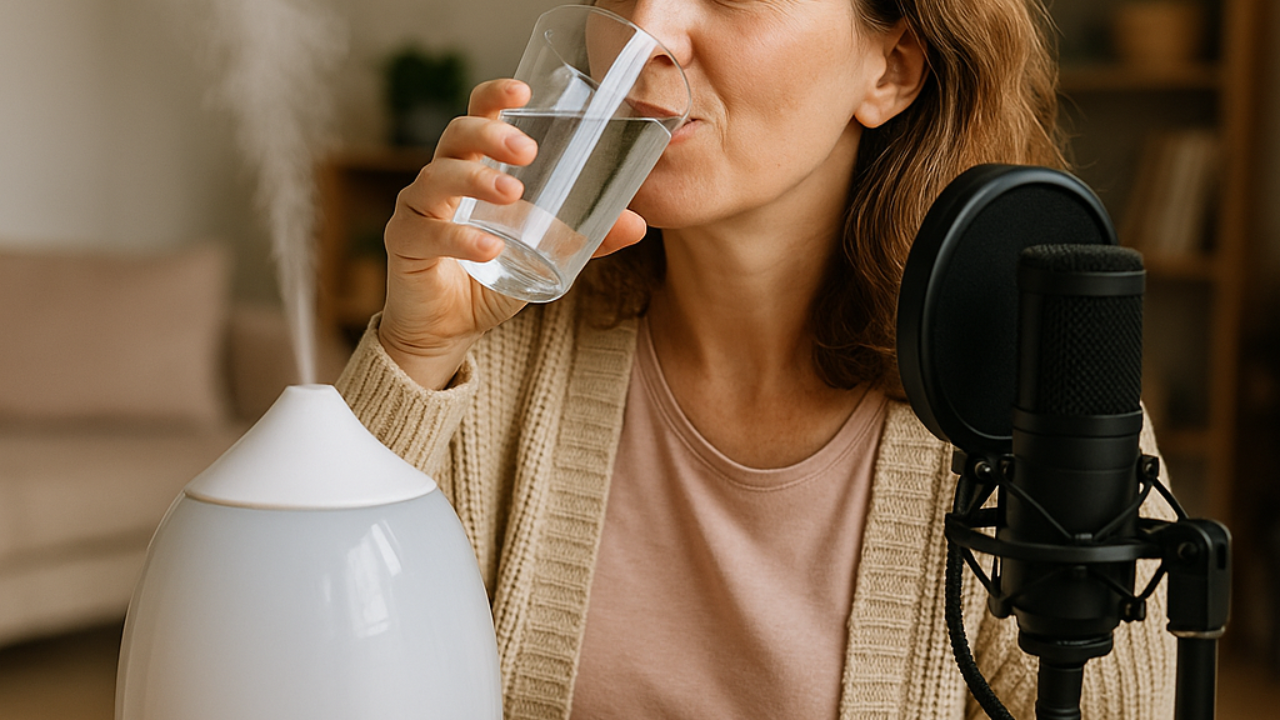Protecting Your Voice: Essential Vocal-Health Tips for Moms 35+
Between late-night feedings, morning meetings, and 24/7 talking, your vocal folds endure more mileage than you think. Add perimenopause dryness, and the risk of hoarseness skyrockets. Below are seven evidence-based habits that keep your instrument supple—no fancy gadgets required.
1. Chase Water, Not Caffeine
Rule of thumb: For every 8 oz of coffee or wine, add 12 oz of plain water.
Hydration keeps the mucosal layer thin so folds vibrate with less collision.
2. Humidify Your Bedroom
Aim for 40–60 % relative humidity. A cool-mist humidifier overnight reduces morning raspiness.
Bonus: It calms nasal passages, improving resonance.
3. Adopt Anti-Reflux Habits
DoAvoidFinish dinner 3 h before bedGreasy or spicy late-night snacksSleep on a 6-inch wedgeFlat-back Netflix binges after mealsChew gum post-meal (stimulates saliva)Excessive peppermint (lowers LES tone)
GERD is the unseen enemy of adult singers; acid mist can blister folds silently.
4. Warm Up—But Also Cool Down
A 5-minute lip-trill set before rehearsal is great, but end with descending hums to flush lactic acid and reduce swelling.
5. Schedule Strategic Vocal Rest
15 minutes of silence after every hour of intense use (teaching, Zoom, rehearsal) lets tissues recover. Use text-to-speech or voice-amplifier apps when parenting gets loud.
6. Mind Your Meds
Common culprits that dry the voice:
Antihistamines
Certain birth-control pills
Diuretics
Ask your doctor about voice-friendly alternatives; meanwhile, double your water intake on dosage days.
7. Annual “Voice MOT” with an ENT
A baseline stroboscopy catches nodules or polyps early. Over 35? Add a thyroid check—hormonal imbalances can thicken folds.
HabitDaily TargetWhy It WorksHydration½ body-weight oz waterLubricates mucosaHumidity40–60 % RH at nightPrevents morning raspVocal Rest15 min per hour of useTissue recovery
Frequently Asked Questions
Is warm tea actually hydrating?
Yes—temperature doesn’t matter; caffeine content does. Herbal or decaf teas count toward your daily water goal and can soothe the throat if you skip citrus and mint (both can trigger reflux).
Should I use throat sprays?
Avoid numbing or menthol sprays—they mask pain and often lead to over-use. If you need quick relief, choose a glycerin-based lubricating mist or simple saline rinse instead.
How much water is “enough” for singers?
A good baseline is half your body weight in ounces (e.g., 140 lbs → 70 oz), plus 12 oz for every caffeinated or alcoholic drink. Monitor urine color—pale straw means you’re hydrated.
Can I sing if I feel a tickle in my throat?
A mild tickle is often from dryness—sip water, do two minutes of gentle straw phonation, and reassess. Pain, sudden hoarseness, or loss of high notes? Rest and consult an ENT if symptoms persist.
Next Steps
Track water intake for a week—note the difference in morning clarity.
Want a more guided adventure? Check out our Vocal Refresh app!
Healthy folds = happy notes. Start with a glass of water, plug in that humidifier, and let your voice shine every day. 💧🎤

